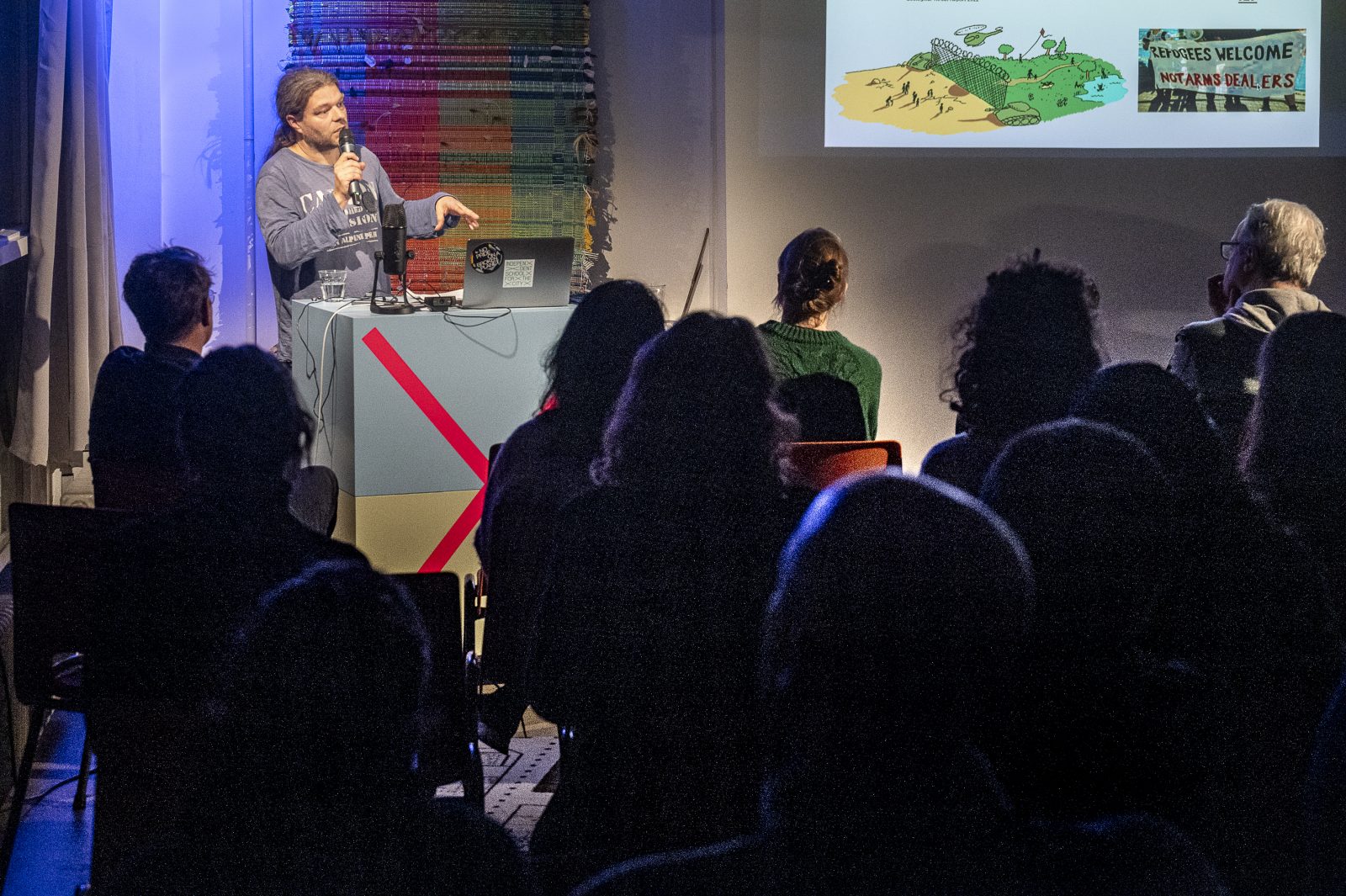Back to School with… Lena Knappers & Bram van Ooijen #2
Session #2
Global climate borders and mobility justice
The second in a series of three evenings about climate change, environmental justice and migration, with Mark Akkerman and Mimi Sheller. Tuesday 05 November, 19:00 - 21:00, dinner served at 18:00.

Session #2 - Global climate borders and mobility justice
During the second event we examine intersections between climate justice and migration. Many in the Global North enjoy the benefits of extraction economies that exacerbate ocean acidification, rising sea levels and drought. While these changes affect people around the world, many in the Global South bear the brunt of the climate crisis. Environmental justice theory and activism seek to address these uneven distributions of the benefits and burdens of environmental harm. Climate justice and mobility justice attempt to correct the injustices caused by the climate crisis. As globalised environmental and climate injustices force people to move, legal scholars debate the ethics of exclusionary immigration policies in the European Union and the United States of America.
Climate-induced migration
The United Nations International Organisation for Migration (IOM) has cited estimates of as many as 25 million to 1 billion climate migrants in the next 30 years, while other projections point to 1.4 billion by 2060.
Climate induced migration takes place disproportionally in low-income countries and intersects with many other causes for displacement. The people most affected by climate change are those already experiencing threats to their lives and livelihoods, including degraded environments, income instability, lack of affordable healthcare, inadequate sanitation, poor governance, and a lack of personal agency or ability to change their circumstances. Nations have an obligation to offer asylum to refugees, but under the legal definitions of the refugee, still based on the 1951 Refugee Convention, this does not include those who have to leave their home because of climate change. Therefore, many people cannot find a safe and healthy place to live because they are not qualified as refugee. At the same time, the world’s wealthiest countries spend more on arming their borders to keep migrants out, than on tackling the climate crisis that forces people from their homes in the first place, even when exactly these prosperous industrial countries have caused climate change and high carbon emission based on coal, oil and gas. Migration flows come at a terrible human cost. It is therefore important to investigate in more just alternatives for the way we are dealing with climate change, migration and the organisation of space today.
About Mark Akkerman
Mark Akkerman is a researcher at Stop Wapenhandel and for the Transnational Institute (TNI), working on arms trade, the arms industry, its lobby, border militarisation and EU funding and policies in these regards. Also active in several action groups in the peace and no border movements.
Stop Wapenhandel (https://stopwapenhandel.org/) is an independent research and campaign organisation against arms trade and arms industry. TNI (https://www.tni.org/en) is an international research and advocacy institute committed to building a just, democratic and sustainable planet.
Mark Akkerman will talk about the "Global Climate Wall: How the world’s wealthiest nations prioritise borders over climate action". Climate change is increasingly a factor behind displacement and migration, often because it amplifies or interacts with other drivers of migration, such as conflict and poverty. While the consequences of climate change disproportionally impact poor and marginalised communities, those least responsible for the climate crisis, the world’s wealthiest countries react by militarising their borders. These countries – which are historically the most responsible for the climate crisis – spend more on arming their borders to keep migrants out than on tackling the crisis that forces people from their homes in the first place. The arms industry (in the Global North), already on the winning side in these times of rapid militarisation and increasing military budgets, is the main profiteer of these untenable policies.
About Mimi Sheller
Mimi Sheller, Ph.D., is Inaugural Dean of The Global School at Worcester Polytechnic Institute, in Massachusetts. Sheller is an interdisciplinary social scientist with work in Caribbean Studies, Mobilities Research, and Social Theory. Sheller was founding co-editor of the journal Mobilities, and past President of the International Association for the History of Transport, Traffic and Mobility. She has published more than 150 articles and chapters, and recent books include Advanced Introduction to Mobilities (Edward Elgar, 2021); Island Futures: Caribbean Survival in the Anthropocene (Duke University Press, 2020); and Mobility Justice: The Politics of Movement in an Age of Extremes (Verso, 2018).
Mimi Sheller will talk about "From Climate Panic to Mobility Justice and Commoning: Shifting the Narrative". How can we move from panic about climate migration, which is contributing to border closures and recent xenophobic violence, toward a more just approach to climate-related mobilities that protects people, places and planet? I will suggest an approach grounded in mobility justice that places ethical mobilities and commoning at its heart. New narratives about climate mobilities can help us recognize our own relationality with others, realize the need to limit excessive energy use, and promote greater sharing in how we move, how we design infrastructure, and how we manage energy, water, food and other resources, as well as limit waste and pollution in our waters, oceans and atmosphere.
Programme
18:00 - 19:00 Doors open and dinner served
19:00 - 19:30 Introduction by Lena Knappers and Bram van Ooijen
19:30 - 20:15 Lecture by Mark Akkerman (Transnational Institute) on how the world’s wealthiest nations prioritise borders over climate action + Q&A
20:15 - 21:00 Online lecture by Mimi Sheller on the concept of mobility justice
21:00 Drinks at the bar
This event is the second in a series of three about climate change, environmental justice and migration, curated by Lena Knappers and Bram van Ooijen. The lecture series derives from the research and design project ‘Humanity on the move’, which was part of the open call ‘designing a climate just world’, organised and subsided by the EFL Foundation. More info here.